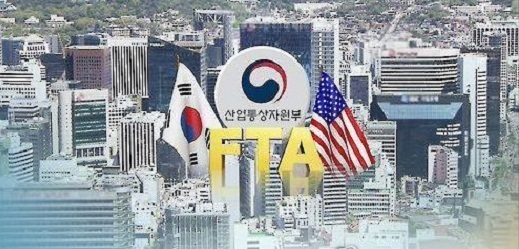The Ministry of Trade, Industry and Energy announced Tuesday that it plans to submit a report regarding its plans to renegotiate the Korea-US Free Trade Agreement to the National Assembly on Dec. 18.
Submitting the plans to the parliament will mark the conclusion of the necessary procedures here in order to begin trade talks with Washington.
Under current laws, the government is required to make a report to the legislature about the target, agenda and countermeasure plans in entering a negotiation of a trade pact.
 |
(Yonhap) |
Since holding the first joint special session on the KORUS FTA in August, in which the Trump administration initiated its push to revise the trade pact, the Korean government has held two public hearings and consulted with some 20 ministries and experts regarding the potential economic gains and repercussions when revising certain sectors of the 5-year-old deal for its proposal.
The Trump administration must also hold public hearings and submit its negotiation plan to Congress 30 days before bilateral meetings can commence if it wishes to make full-fledged changes to the agreement.
While Seoul has been fulfilling its side of the procedural requirements, observers predicted the US would not be prepared to launch trade talks by the end of the month, considering the upcoming Christmas and New Year’s holidays
During Trump’s state visit to Korea last month, the two governments announced they have agreed to promptly commence KORUS amendment. Although the US has yet to officially announce whether it intends to push forward with a full or partial revision of the agreement, due to the request for a speedy wrap-up, local trade officials have noted the US would most likely not pursue a full-fledged revision of the FTA.
Kim Hyun-chong, Seoul’s chief negotiator, previously stated that only a “small package” of the deal should be subject to revisions, adding that the US business community have expressed issues limited to nontariff barriers and implementation problems.
During the second public hearing on KORUS held Friday, a panel of local trade experts said that the US is expected to narrow its focus to the automobile and steel sectors.
Considering the strong push for a higher percentage of American auto parts to be used by its major trading partners through its ongoing North American Free Trade Agreement revision talks, industry officials predicted that similar provisions would be requested by the US when amending KORUS.
NAFTA provisions currently stipulate that in order to export automobiles made in Mexico or Canada to the United States tariff-free, 62.5 percent of their auto parts must be produced within the three countries. However, the Trump administration is now arguing that this proportion should be increased to 85 percent and that 50 percent of the auto parts should be procured in the US.
Aside from the automobile sector, the farming community has also raised strong concerns over whether or not the US will push to further open Korea’s agricultural sector.
Following the first public hearing on the FTA last month and a huge protest by representatives of the agricultural community, the Korean government said it was opposed to lowering tariffs in the agricultural sector and even went as far to say it is ready to terminate the trade deal if necessary.
Lee Jin-myeon, a researcher at the Korea Institute of Industrial Economics & Trade, warned that the Seoul government must approach the negotiation with caution and not revert to a mindset endorsing trade protection.
“The FTA backlash is likely to have a negative impact on trade relations as well as with investment deals already established by the two nations,” Lee said. “It is necessary that we set the tone for the upcoming revision negotiations as one of compliant willingness for additional market opening.”
By Julie Jackson (
juliejackson@heraldcorp.com)







![[Weekender] Korea's traditional sauce culture gains global recognition](http://res.heraldm.com/phpwas/restmb_idxmake.php?idx=644&simg=/content/image/2024/11/21/20241121050153_0.jpg)
